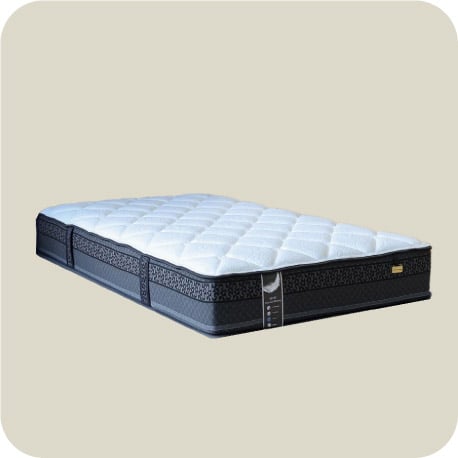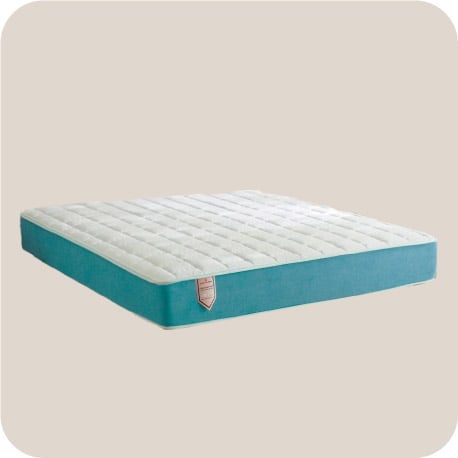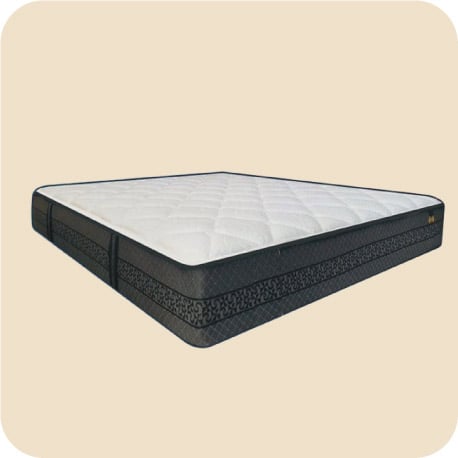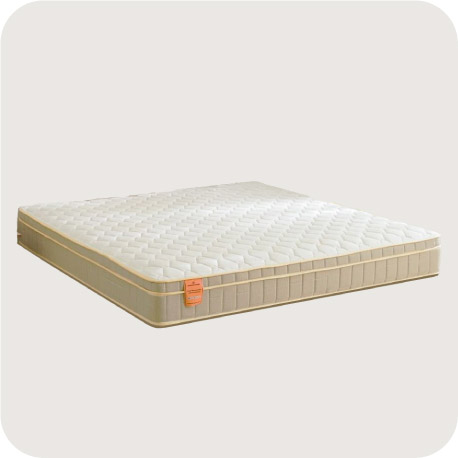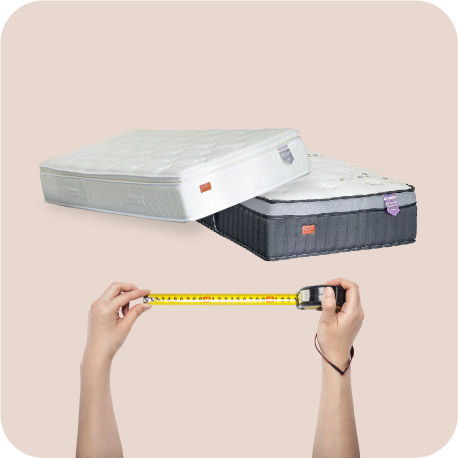Mattresses
Mattresses in OMAN
Buy the best mattresses in the OMAN at Danube Home!
Nothing spells comfort and relaxation like unwinding at the end of a long day and sinking into a comfortable mattress. Your choice of mattress is crucial for multiple reasons, but most importantly, on account of the fact that on average, humans spend up to 7 years of their lives trying to get to sleep-that’s time spent tossing, turning and shuffling in bed! Given how much of an impact a mattress can make on the quality of one’s sleep, it is vital to pick the right one. Whether you’re looking for a mattress store in Muscat, Saiq, Salalah, or anywhere in the OMAN, look no further than Danube Home. Enjoy browsing through our versatile range of mattress options online or in-store from our various outlets spread across the OMAN.
We understand that buying a mattress requires researching multiple factors based on material composition, size, price, etc. Here’s a guide of what to look for when buying a mattress:
Material:
Mattress material is crucial to determining the quality of the mattress, and the most popular materials include foam, latex, innerspring, and hybrid.
- Foam mattresses feature at least one layer of memory foam or polyfoam, along with a central core of high density polyfoam. High density foam is more durable and resistant to wear and tear as compared to low and medium density polyfoam, which tends to break down more easily. The presence of memory foam supports spine alignment and pressure point pain relief.
- Innerspring mattresses are known for their coil system core, and contain a layer or two of polyfoam. They provide a wide range of support and are a popular mattress option.
- Latex mattresses are crafted from the material latex that is extracted from rubber trees, as well as sourced from synthetic sources. These mattresses tend to have a longer life span and provide good motion isolation and coolness.
- Hybrid mattresses are, as their name suggests, a combination of memory/latex foam and a coil system at the core. They provide more comfort and support than innerspring mattresses and have great motion isolation.
Shop the best mattresses online at Danube Home OMAN
The key to restful sleep is a good mattress, and the key to picking the right mattress is consideration of the following factors:
Level of support:
It is vital for a mattress to provide adequate support and alignment to the spine and pelvis, and avoid excessive sinkage.
- Durability: Mattress durability refers to the ability of a mattress to withstand wear and tear and continue to function well over a long period of time. On an average, mattresses last an average of 7 years before they need to be replaced.
- Motion Isolation: Motion isolation refers to the ability of a mattress to isolate motion and movement and restrict it so as to not transfer throughout the bed and cause disruption and disturbance across the bed. Mattresses with motion isolation are, therefore, a great option for those who share a bed with a partner, or even children and pets for that matter.
- Temperature: Another factor to keep in mind while choosing a mattress is temperature, as certain materials and mattress types may trap body heat and cause discomfort.
- Pressure: Mattresses provide different levels of pressure relief, some mold closely to support the spine and hips, as well as provide relief to all pressure points, and tend to be made out of latex and/or memory foam.
- Edge support: An important consideration for those who tend to sleep near the edge of the bed, mattresses with edge support can come in the form of foam/steel reinforcement, while those made of memory foam tend to take on the shape of your body.
FAQs- Mattresses
Q. Which mattress is good for back pain?
A. While there is no one-size-fits-all approach to finding the perfect mattress, characteristics to look out for in a mattress good for back pain include:
- Firmness: The common notion is that a firm mattress is best for sleepers suffering from back pain, that doesn’t seem to be the case, after all. This is because it is important for a mattress to contour and provide adequate support to the spine, which may not always be the case with a firm mattress, so be discerning while choosing a firm mattress.
- Mattress material: The most common type of mattress material prescribed to those with back pain is memory foam, which provides an incredible level of spine support and contouring. This aids in providing pressure relief from all pain points, as well as spine and back alignment.
- Sleeping position: Research has shown that the ideal firmness for your mattress also depends upon your sleeping position. Accordingly, back and stomach sleepers need moderately firm mattresses, while side sleepers should ideally go for slightly softer mattresses.
Q. How do I choose a mattress?
A. Factors to keep in mind while choosing a mattress include:
- Sleeping position: Whether you tend to sleep on your back, stomach, side, or some combination of all three, your ideal mattress will differ. If you prefer sleeping on your back, a mattress that is too firm might stiffen your back and shoulders, while a mattress that is too soft might mess with the alignment of your spine and hips. Alternatively, if you fall into the category of side sleepers, a softer mattress would be the best for you, since it would help contour to the shape of your body and provide pressure relief. Finally, if you are a stomach sleeper, a firm mattress would suit you well.
- Material: Memory foam mattresses are great for providing deep-seated contouring and more of a soft feel, while latex foam mattresses are perfect for combination sleepers, because they allow a wide range of motion. Innerspring foam mattresses tend to be bouncy and firm in nature, and is great for heavier sleepers. Hybrid mattresses are a relatively new type of mattress, combining coils and springs with foam, good for mobility and bounce.
- Weight: Your weight is also an important deciding factor when it comes to choosing a mattress, because factors like support, cooling, sinkage and the overall feel of the mattress are affected by your weight. Therefore, if you are a light sleeper (under 150 pounds), a mattress with a firm feel would be a good option in order to avoid sinkage. If you fall in the average category (150-200 pounds), a bed with average firmness is a good idea, while heavier sleepers (above 200 pounds) would benefit from a firm mattress with coil, preferable.
Q. What is the best type of mattress?
A. Since there is no one-size-fits-all perfect mattress, here’s a list of features of a good mattress:
- Foam density: There is a direct correlation between the level of density and the level of support and comfort it provides. Moreover, it also determines how durable your mattress will be (higher the density, higher the durability).
- Comfort: A good quality mattress provides comfort across many aspects, including the right temperature, comfort in movements, as well as muscular and skeletal comfort and support.
- Motion isolation: Motion isolation refers to the feature of mattresses that allows them to absorb motion from one person, so when one person shifts in their bed, it doesn’t disturb the other.
Q. Which mattress is best for couples?
A. Given that the quality of your sleep is majorly influenced by how good your mattress is, purchasing the right mattress is a crucial decision. If you share your bed with a partner, you would naturally need to reach a consensus/middle ground regarding the level of firmness your mattress will need to have. On the firmness range, that would fall between 4-6 (out of 10).
An incredibly important mattress feature for couples is motion isolation. Motion isolation refers to the absorption of motion and movement made by the mattress foam, so as to prevent the tossing and turning of one person from disturbing the other.
Q. Is it better to sleep on a hard mattress or a soft mattress?
A. The appropriate level of mattress firmness tends to differ from person to person, and depends on a combination of factors:
- Comfort level: First and foremost, the level of firmness or softness of your mattress depends upon your individual preference. Do you prefer sleeping on a firm or soft mattress?
- Sleep position: The position in which you tend to sleep in impacts how firm or soft you might prefer your mattress to be. Stomach and back sleepers, for instance, prefer firm mattresses, while side sleepers tend to prefer softer mattresses.
- Body size:It is commonly observed that those who tend to be on the lighter side prefer mattresses between the soft to firm range, as they might find firm mattresses uncomfortable, while heavier sleepers tend to prefer firmer options in order to avoid excessive sinkage.
